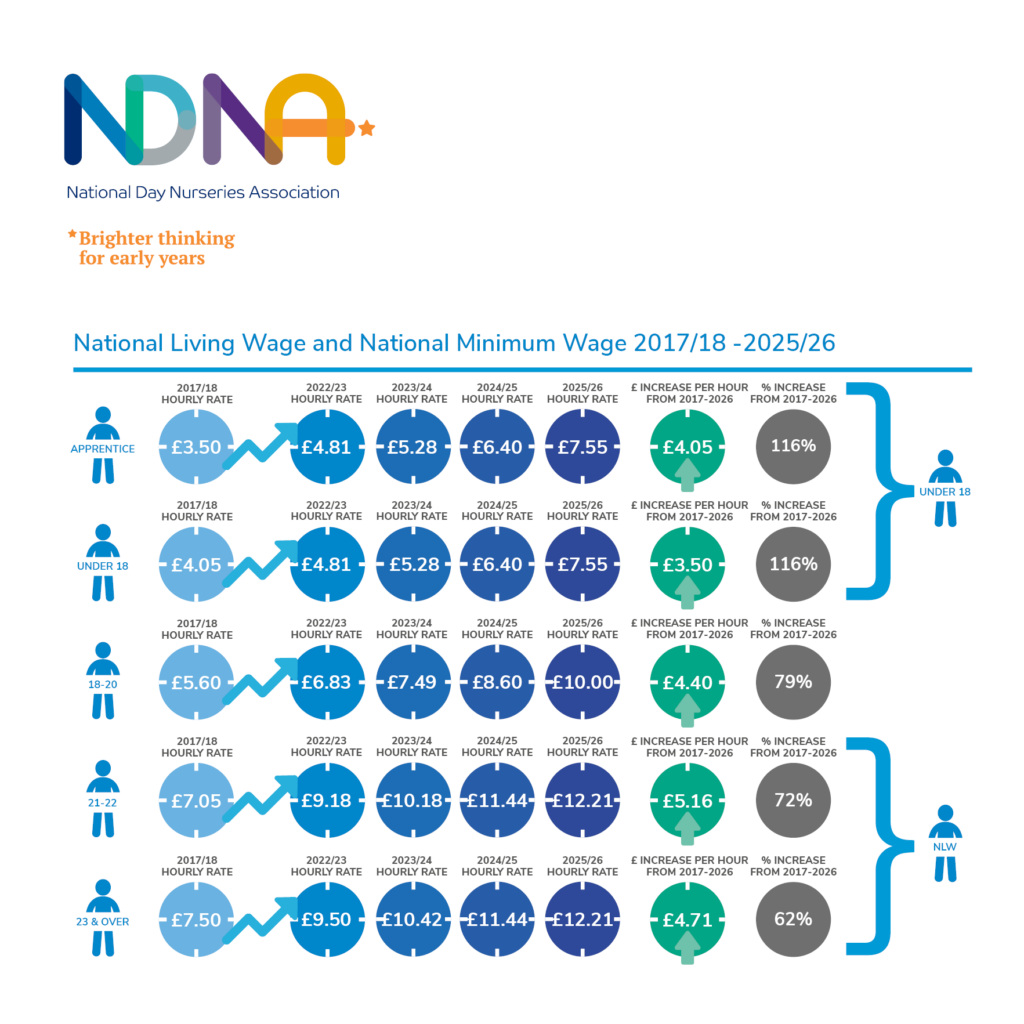
Minimum wages to rise at above inflation rates
National mandatory minimum wages are set to rise next year by between 6.7% and 18%.
The Government has accepted the Low Pay Commission recommendations that the National Living Wage rises from £11.44 to £12.21 from April 2025. This 6.7% rise will benefit anyone aged 21 and over. The Labour Government’s intention is to give one wage rate to all adults aged over 18 but this will happen in stages.
For adults aged 18 to 20 the National Minimum Wage will be increased from its current rate of £8.60 to £10 for 2025-26. This is a jump of 16%.
Apprentices and those aged 16 and 17 will receive the biggest rise from £6.40 to £7.55 per hour, 18% more than they are paid currently.
Responding to this announcement, Purnima Tanuku OBE, CEO of NDNA said: “Staff in the early years sector do amazing work giving our youngest children the best start in life. It’s right that our lowest-paid workers receive a boost in pay to take into account inflation and the rising cost of living.
“The Low Pay Commission looks at living costs but not the full picture for employers. This substantial hike in minimum wages will mean that early years providers have a much bigger salary bill from April 2025. To deliver the expansion of early education and care places, the sector needs to recruit another 35,000 staff. However, if funding rates do not keep pace with rising wages, it will be impossible for providers to meet demand.
“Since 30 hours of funded childcare was introduced in 2017, statutory pay has increased by at least 62% and some categories have more than doubled. At the same time, funding rates for three and four-year-olds have only increased by 27% making it harder for employers to make ends meet.
“With the Government estimated to be buying 80% of all childcare hours from nurseries next year, it’s critical that the sector’s biggest customer pays a fair rate. Ministers have committed to funding increases linked to inflation, statutory wage rises and average earnings, so they need to meet this commitment when funding rates are published later this year.”

NDNA gave evidence to the Low Pay Commission earlier this year which recognised in its report that employers in low pay sectors were ‘highly constrained’ by their ability to pass cost increases on. NDNA spoke to the Commission about rising costs for early years providers and the need to phase in any changes to the age bandings. It’s also important for them to be able to maintain pay differentials for more experienced staff.
Since 2017 when the National Living Wage came in, it has increased by 62 – 72% and the National Minimum wage by 78.5%, yet the funding rate for early years places has only risen by 27%. Apprentices will be receiving 116% more than in 2017.
Baroness Philippa Stroud, Chair of the LPC, said: “The Government have been clear about their ambitions for the National Minimum Wage and its importance in supporting workers’ living standards. At the same time, employers have had to deal with the adult rate rising over 20 per cent in two years, and the challenges that has created alongside other pressures to their cost base.
“It is our job to balance these considerations, ensuring the NLW provides a fair wage for the lowest-paid workers while taking account of economic factors. These rates secure a real-terms pay increase for the lowest-paid workers. Young workers will see substantial increases in their pay floor, making up some of the ground lost against the adult rate over time.
“The data show some signs of employers finding it harder to adapt to minimum wage increases. The tightening of the labour market since the pandemic has unwound, but the overall picture is similar to 2019.The economy is expected to grow over the next year, although productivity growth remains subdued.”
Similar Articles
What are the changes to Government guidance and what is NDNA doing to support members?

Government research shows school-based nurseries are not delivering flexible provision to its communities


